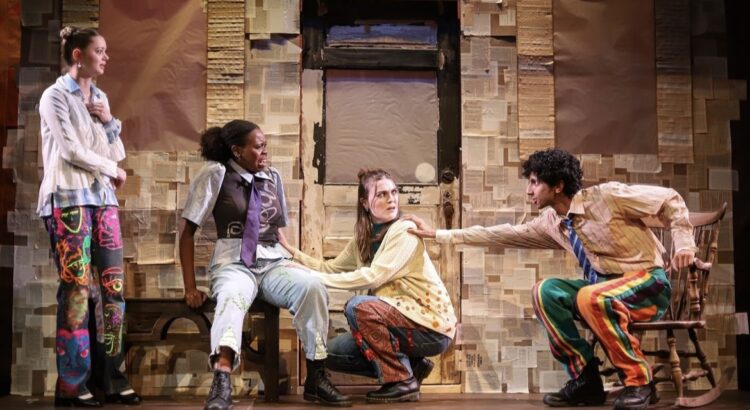November 16 | 7:00 pm | Newman Studio
It seems director Natalie Tell found the question of time most interesting in her multilayered senior thesis, Plano. What really is now? What is later? Earlier? Suddenly? And where do our lives fit into a structured system of a concept that refuses to be contained? These questions were presented in her attuned director’s note in the program, but I found that more prominent themes of identity and male-induced panic rose to the surface onstage.
Plano lets us loose in a semi-mythical Texas in the home (or rather, on the porch) of three sisters, Anne (Maya McEntrye), Genevieve (Hannah Long), and Isabel (Audrey Andrews). They are haunted by strange physical things (like slugs, ribbons, ghosts) that all seem to tie back to the patriarchal influences of their unexplored past. Each sister has a different quandary with the primary man in her life: Anne quickly marries John (Joaquin Consuelos) after finding out she is pregnant, but he seems to be with her for the green card; Anne, is married to her less-than-superb husband, Steve (the hilariously erratic Rohan Maletira); and young Isabel finds herself in a relationship with God, but grapples with the presence of looming spirits.
The play establishes a fantastic “handshake” with the audience right out of the gate. The lights come up, and the sisters are having a fiery sharp conversation, darting through time when a character decides, “It’s later.” We discover John (whose real name is Juan) is gay and gallivants off to Plano (a seemingly mystical, metaphorical place) leaving Anne alone with her thoughts. Isabel is afflicted by two Faceless Ghosts who dwell uncomfortably near when she’s alone. When Genevieve and Steve ultimately divorce due to his infidelity, he splits in two (and eventually three) haunting Genevieve’s home and mind.
“A third Steve is making music in the garage. He won’t leave. And the other two Steves are really proud of him.” says Genevieve.
The eclectic universe Ms. Tell crafted was completely alive: props emerged seamlessly, Faceless Ghosts wandered around pre-show, and a bowl of hummus came out of the wall! The curse manifested itself in ways other than through the character’s words, it surrounded them. Ms. Tell’s creative design choices made the script’s (by the poignant Will Arbery) insistent metaphors in the script all the more playful.

Arbery’s book contains rich ramblings, which develop deep and relatable characters, blending humor with the uncanny. The play between reality and surrealism is intricate but such charming performances kept me fully engaged in attempting to unravel the timeline. The three sisters are distinct characters to me, each carrying a strange sense of familiarity. The clarity could stem from Arbery’s vocal inspiration from his seven sisters whom he grew up with in Dallas, Texas (a short distance from Plano, Texas).
Ms. McEntrye, Long, and Andrews are filled with endurance and are constantly thrilling. They relentlessly search for their identities while navigating life and facing the challenges of hegemonic authority from previously trusted men. Ms. Long’s performance was a personal favorite of mine, showcasing her quick wit and unveiled compassion. While their male counterparts can be mundanely loathsome in the world of Plano, the performances by Mr. Consuelos and Mr. Maletira were quirky and deliberate.
Though Ms. Tell’s director’s note emphasized her exploration of time in Plano, I found the most moving aspects of it were its relationship with the women fighting it. It’s difficult to truly grasp the metaphysical concept of time in this piece, as it (seemingly) is not linear, but it was effortless to feel for the strong women’s journey of discovery. To Ms. Tell’s point, time is something we’re always aware of, and these characters certainly are too.
“We’re a tiny part of a tiny thing that never ends…” Anne says.
Plano runs November 15-16 in the Newman Studio. Images thanks to @umichdesignandproduction on Instagram.



